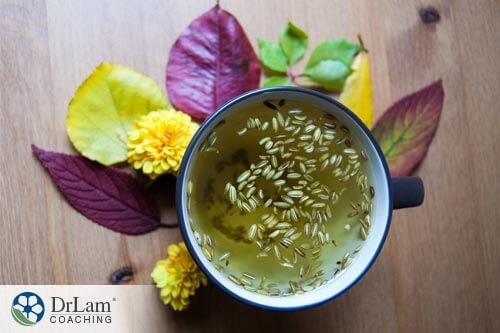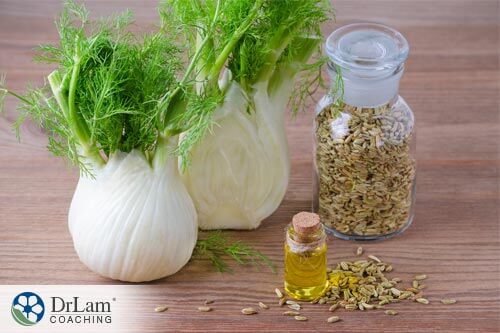 Whenever you are experiencing constant stress, your overall health can go from bad to worse. Specifically, you can eventually develop adrenal fatigue. And when this happens, you can feel completely exhausted and weak. Even worse, your body’s organs and certain functions become overworked and start to fail. To reverse this, one of the most recommended remedies is to make a drastic change to your daily diet. Certain foods that can help alleviate adrenal fatigue symptoms, such as fennel. In fact, the benefits of fennel help relieve symptoms of adrenal exhaustion so that you have a better chance of recovery.
Whenever you are experiencing constant stress, your overall health can go from bad to worse. Specifically, you can eventually develop adrenal fatigue. And when this happens, you can feel completely exhausted and weak. Even worse, your body’s organs and certain functions become overworked and start to fail. To reverse this, one of the most recommended remedies is to make a drastic change to your daily diet. Certain foods that can help alleviate adrenal fatigue symptoms, such as fennel. In fact, the benefits of fennel help relieve symptoms of adrenal exhaustion so that you have a better chance of recovery.
Fennel is a winter vegetable that is almost comparable to celery. It is characterized by long green stalks and a white bulb. This vegetable is said to have originated from Mediterranean countries such as Italy and Greece. Today, however, it is common to see fennel grown in France, the United States, Russia, and even India. Fennel is typically harvested during the fall season.
The benefits of fennel are helpful for overall health. This is because fennel possesses important nutrients for the body. According to the United States Department of Agriculture (USDA), these include thiamin, riboflavin, vitamin C, vitamin B6, folate, vitamin A, vitamin E, vitamin K, magnesium, calcium, iron, potassium, phosphorus, sodium, and zinc.
Moreover, what’s great about fennel is that every part of this vegetable is edible. This includes its leaves, stalk, and seeds. Fennel also possesses the nutrients needed to aid and support the body’s stress response.
Whenever a person encounters stress, the body is always ready to react accordingly. For this, it relies on its NeuroEndoMetabolic (NEM) Stress Response system. This is composed of six circuits, namely the hormonal, inflammatory, detoxification, neuroaffect, cardionomic and bioenergetics circuit.
The inflammation circuit is made up of the stress response from the gut, microbiome, and immune system. Generally, when the inflammation circuit detects harmful substances in the body, it responds by creating a hostile environment for them. It also cleans away any cells or tissues that have been damaged by harmful pathogens, an injury, or the immune system’s attack.
 However, stress itself can also be the cause of inflammation. In fact, research has found that chronic or continuous stress can alter the gene activity of one’s immune cells right before they enter the bloodstream. Because of this, they are ready to fight off any trauma or infection, even if there is nothing to fight with. This, in turn, leads to significant inflammation in the body.
However, stress itself can also be the cause of inflammation. In fact, research has found that chronic or continuous stress can alter the gene activity of one’s immune cells right before they enter the bloodstream. Because of this, they are ready to fight off any trauma or infection, even if there is nothing to fight with. This, in turn, leads to significant inflammation in the body.
Another study conducted by Carnegie Mellon University has also found that chronic psychological stress can compromise the body’s ability to regulate its own inflammatory response. This is mainly because the NEM’s inflammatory circuit is also related to its hormonal circuit.
In the hormonal circuit, the adrenal glands produce cortisol, the body’s primary stress hormone, to assist the body in conducting a fight or flight response to stress. Aside from addressing stress itself, this hormone is also responsible for regulating inflammation in the body.
According to the research by Carnegie Mellon University, the immune cells become insensitive to cortisol’s regulatory effects as stress becomes prolonged. Because of this, runaway inflammation develops. And when left to persist, it can trigger a host of diseases.
Meanwhile, as stress continues, the adrenal glands also become overworked. As a result, they are no longer capable of producing the amount of cortisol that the body requires. This results in a severe hormonal imbalance, which then triggers Adrenal Fatigue Syndrome (AFS).
To combat AFS, one must make some critical lifestyle changes to alleviate symptoms and improve one’s quality of life as soon as possible. By doing this, you can also relieve the significant inflammation that has developed in the body due to stress. This can be done with the help of fennel.
You may not realize it, but there are several important benefits of fennel when it comes to adrenal fatigue. This is because this vegetable has been known to possess both antioxidant and anti-inflammatory properties.
In fact, a study conducted by Korea University found that the consumption of fennel can effectively block inflammation processes in the body. Meanwhile, another study conducted by Yonsei University in South Korea found that oral administration of fennel fruit methanolic extract can lead to inflammatory relief.
 On the other hand, fennel can also play a critical role in relieving stress itself. In fact, a study published in the Journal of Obstetrics and Gynaecology in 2018 found that the consumption of fennel can help manage anxiety disorders and depression among women who are experiencing menopause.
On the other hand, fennel can also play a critical role in relieving stress itself. In fact, a study published in the Journal of Obstetrics and Gynaecology in 2018 found that the consumption of fennel can help manage anxiety disorders and depression among women who are experiencing menopause.
Meanwhile, another study published in the Iranian Society of Physiology and Pharmacology journal in 2011 also found that fennel is effective in reducing one’s anxiety levels. In addition, a study conducted by Tarbiat Modares University in Tehran found evidence that fennel is effective in alleviating the effects of heat stress. All these suggest fennel is helpful in relieving both physical and psychological stress.
Indeed, there are several important benefits of fennel when it comes to adrenal fatigue.
Now that you know how fennel can help you fight off both adrenal fatigue and stress, it’s time to figure out how you can reap the benefits of fennel. Before you try it, however, remember that it is always best to consult with your physician first.
This is because the consumption of fennel, like other vegetables, can trigger an allergy or intolerance reaction in your body. This is especially true if a person is sensitive to the likes of carrot, mugwort, and celery. If this is the case, you may suffer from common food allergy symptoms such as abdominal pain, nasal congestion, wheezing, diarrhea, face swelling, lightheadedness, dizziness, and even fainting. Depending on your medical history, your physician may recommend that you undergo an allergy or intolerance test to rule out the possibility of suffering from any of these symptoms after ingesting fennel.
That said, here are some easy tips on how to add fennel to your diet.
Perhaps, the easiest way to incorporate fennel into your daily diet is by having some fennel tea with your meals. To do this, just boil a few tablespoons of fennel seeds in water. Afterward, you can strain the seeds out and pour the tea into a cup.
If you enjoy preparing fresh vegetable and meat stocks for your dishes, you can readily add a bulb of fennel to the pot. Let the mixture boil and strain the fennel along with the other vegetables and/or meat bones in your stock.
Because of its licorice-like taste, fennel can be a good addition to salad dressings. Just crush fennel seeds and sprinkle them into the dressing for added flavor.
It’s not just savory dishes that you can add fennel to. In fact, you can also enjoy some fennel for dessert. Just crush some fennel seeds into a fine powder and add them to cake or muffin batter. You can also sprinkle these on top of your favorite ice cream.
This casserole dish can be made by layering potato slices and thinly sliced fennel and adding in a sauce made with low-fat milk and cheese.
Now that you have a better idea of how you can incorporate fennel more into your daily diet, it’s time to think about the kinds of dishes and drinks that you can prepare with fennel at home. These dishes can help significantly with your adrenal recovery.
To help you get started, here are a number of easy fennel recipes:

Some of these recipes can also be made in big batches over the weekend. This way, you can keep eating healthy and nutritious dishes and experience the many helpful benefits of fennel throughout the rest of the week.
If you are suffering from symptoms of adrenal fatigue now, remember that there is always a path to relief. The benefits of fennel are proof that your quality of life can improve if you just make some important changes to what you eat. With planning and consideration, there is no doubt that you can beat adrenal fatigue for good.
According to various studies, the benefits of fennel include the reduction of inflammation caused by chronic stress as well as a reduction in anxiety levels. There is also evidence to suggest that fennel is effective in improving the way the body processes stress.
